FOOD AND SEX are often linked in both erotic fiction and feminist writing. Connecting the body with images of eating is both playful and predatory, childlike and cannibalistic. But rarely are the themes as charged as in Easy Bake, a new play by local writer Wesley Middleton.
Easy Bake
Speakeasy Backroom, ends June 25
In the glassed-in confines of a contemporary peep show, four dancers gyrate and move for the eyes of the regulars, who watch through windows they keep open with a steady stream of quarters. As the women dance, we hear not only their taunts to the voyeurs through the soundproof glass, but their own half-articulated thoughts—of food, money, and sexual fulfillment. Though they are objects of desire, they themselves are dominated by hungers.
Middleton’s deliberately over-the-top language is inspired by a collection of Betty Crocker menu cards from the ’70s and will keep you off desserts for a week. The four actresses each pull something valuable from the mix, particularly Cecelia Frye as the “still asleep” Betty, carefully denying her own past traumas, and Raquel Rosen as the naﶥ young Wiggy, whose professional struts and pouts show she still has not understood the complexities of the game.
Several technical problems with this production hobble the poetic language, however. For modesty’s sake, the actresses wear their pasties over body stockings, which keep them relatively warm and demure, but are frankly inelegant and not sexy in the least. Anita Montgomery’s direction also leaves those actresses not speaking aimlessly gyrating while waiting for the next dose of sugar-frosted monologue.
A more fundamental problem is that the play tells us one thing while showing us another. Middleton seems to say that the other side of the peep show glass is a very different world, separate from the manufactured product of desire the customers expect. But although the stage contains a dressing room, we never see any of the women truly “off-stage.” All references to a life outside are either fantasies or memories.
What’s more, the story itself is only activated through the arrival of the play’s one male character, Michael McQuilken as the enigmatic “Eggman.” Until this odd customer arrives and begins trying to seduce the various dancers through the glass, there’s no sense of real conflict. Consequently, just like a real peep show, the audience never sees enough humanity in the dancers to believe that they could inhabit the outside world.








